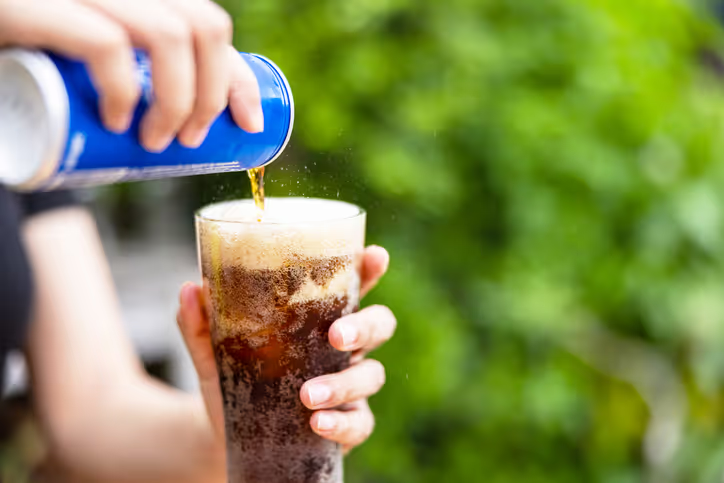Sweet, fizzy, and caffeinated⸺soft drinks are available everywhere you go, and in the last 50 years consumption has increased by 500% in the U.S. If you have a habit of drinking soda for that daily energy boost, you’re not alone. According to the Centers for Disease Control (CDC), 63% of U.S. adults report drinking soda at least once a day.
When you consider the habits you can adopt to promote healthy weight loss, kicking your soda habit may top your list. But will you lose weight if you stop drinking soda? Read on to find out.
Sugar and calories in soda: How unhealthy is soda, really?
Nothing contributes more added sugars to the American diet than sugary beverages, and soda is the primary culprit. On average, a 12-ounce regular soda contains 156 calories and 37 grams of sugar. The amount of sugar in a soda equals a staggering nine teaspoons. Soda often contributes to weight gain because it makes you prone to over consuming calories. You can drink a lot of soda without feeling full or satisfied. Between the calories in a soda and the calories in a meal it accompanies, there’s a good chance you’ll consume more calories than you bargained for. And if you consistently consume more calories than your body needs, you could gain weight.
Not only can soda drinking lead to weight gain, but it's’ sugar content can contribute to other poor health outcomes. According to the American Heart Association, men should stay under nine teaspoons of added sugar daily. Women should limit intake to six teaspoons or less. One regular soda is enough to send women well over the daily sugar limit, and that’s before considering the other foods and beverages they may consume with added sugars throughout the day.
Other outcomes of drinking soda
A 2016 study published in the Journal of Nutrition found a link between high sugar beverage consumption and increases in insulin resistance, along with a greater chance for prediabetes. Insulin resistance is a condition where your body’s insulin doesn’t function properly. This means that it’s unable to draw glucose into the cells to use as energy effectively. Glucose builds up in the blood over time and leads to high blood sugar levels, a risk factor for type 2 diabetes. Excess sugar may also lead to increased body fat, triggering insulin resistance. Moreover, a high intake of sugars also gives rise to inflammation. This can make you more susceptible to chronic diseases, including heart disease.
Cutting out soda for weight loss and other benefits
While avoiding soda can increase your chances of weight loss, it's not guaranteed. For weight loss to happen, there has to be a calorie deficit so eating a healthy diet is vital. Still, there are many health benefits of a soda-free life beyond lower calorie consumption. Less soda means more opportunities for hydration by drinking more water during the day. If you’re an avid soda drinker, reducing soda may also help your body become more sensitive to insulin. When your body’s insulin is well-functioning, it can efficiently regulate your blood sugar levels and lower your risk of type 2 diabetes.
The CDC reports that soda drinkers are more likely to engage in poor habits such as smoking, not sleeping enough, exercising little, and eating a lot of fast foods. Cutting out soda for weight loss may also lead you to alter other lifestyle habits for total health. Sugary beverages are also tied to dental cavities, kidney, liver, and heart disease, so avoiding them may lessen these risks. A 2020 study found that swapping soda for milk improved blood pressure, a risk factor for heart problems. Steering clear of soda could even improve your mood. One study found excessive soda drinkers were more anxious and depressed.
How much weight can you lose if you stop drinking soda?
How much weight you’ll lose if you stop drinking soda isn’t certain. If someone typically drinks 500 calories worth of soda daily and replaces it with water while eating the same diet, they are very likely to lose weight. But if someone replaces the 500 calories of soda with another sugary beverage, or more calories from food, they may not see weight loss. Increase your chances of weight loss by replacing soda with a healthy substitute for your favorite fizzy drink.
Healthy soda alternatives
Switching up your beverage of choice isn’t easy, and quitting soda cold turkey isn’t realistic for everyone. You can slowly cut back while introducing healthy beverage alternatives to your diet. Doing so will bring you closer to meeting your health goals.
1. Homemade flavored water
Consider using lemon, lime, cucumber, fresh fruits, and mint leaves to flavor your water naturally. Try making a large pitcher of flavored water to store in the fridge or add ingredients to a fruit-infuser water bottle.
2. Sparkling water
A boom of sparkling water varieties in the last ten years has made avoiding soda an easier decision. Sparkling water gives you the fizziness of soda without the extra sugar, and most types are free of added sugars, dyes, and artificial ingredients. With little to no calories per serving, sparkling waters offer subtle flavors using small amounts of natural fruit juices, purees, or fruit extracts.
3. Iced herbal tea
There are plenty of tasty herbal teas available that you can purchase unsweetened. Add a squeeze of lemon, and you have a healthy beverage to pair with your meal that supports your weight-loss journey.
4. Sodas sweetened with Stevia
Wellness brands are producing soda alternatives sweetened with stevia, a non-nutritive sweetener from the stevia leaf. Non-nutritive sweeteners offer zero calories and can be 200 times sweeter than table sugar. These brands have cracked the code to make weight loss more achievable by creating flavors that mimic the flavors of popular soft drinks without all the added sugar.
How Form Health can help you reach your weight loss goals
If you’re a person living with obesity, know that soda is unlikely to be the sole cause of weight gain. Weight gain and obesity can be complex and caused by multiple factors, some within our control and some outside our control. Consuming high calorie drinks like soda may sabotage your weight loss efforts, so taking control of your soda consumption can transform your health in many ways.. Sustainable weight loss comes from more than merely swapping soda for more water, you will also need to eat a diet rich in nutrient-dense foods and move your body more regularly. To get personalized support from a Registered Dietitian and a board-certified Doctor as you embark on your weight loss journey, take our quiz to find out if you are eligible for Form Health medical weight loss program.




